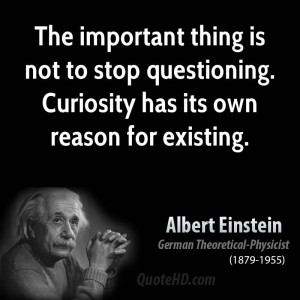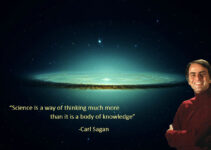Intro to Human Ingenuity
What is the most important and fundamental thing that humanity possesses?
Is it our ability to communicate? Is it technology and great feats of engineering that we are capable of? Is it our complex social conventions we have established over time to connect and to bond with each-other? Is it the great lengths we go to persevere over problems we face as a society & humanity? Perhaps it lies in the field of medical technology and drugs/vaccines to fight diseases? Maybe it is in the amount of knowledge humanity has collected thus far?
I argue that our greatest possession is our minds, which allow us to think, form arguments, and to reason. Rene Descartes, on this very topic, created one of the most powerful arguments in history of philosophy (will be covered in future blog entry). In that argument, he concluded that humans exist as a thinking being due simply to our ability to think. “I think, therefore I am,” he argues.
Without our ability to think and to reason things out, we truly are nothing. Thinking is fundamentally at the core of everything we do as a species. This is one of the main reasons why I believe philosophy exists and why it is the second oldest field of study after only astronomy — astronomy is older simply because you can look up in the sky in amazement and you’re studying the universe (a chimp and three year child is capable of that, which means the very early human species were capable of that much long before they had ability to talk & write/paint in caves).

Photo by MARCS Institute
What is Philosophy?
Philosophy: “The study of ideas about knowledge, truth, the nature and meaning of life, etc” (Merriam-Websters dictionary)
It is as difficult to define philosophy as it is to define “thinking” as neither can have limitations or constraints that we can put a single sentence meaning to. No question is off-bounds in philosophy (although, certain random questions could point to insanity haha). Such questions could be something crazy like “Could a duck swimming upside down with his head faced to 17 degrees to the north make the Earth revolve faster around the Sun?” If we stay true to philosophy over the years, I am sure there were some that would be fine with asking such random questions.
Philosophy often concerns itself with asking fundamental questions that may not be answerable or be impossible to devise an argument for. Since that covers many vast and diverse categories, it makes it even tougher to define what the field includes and excludes.
Why Philosophy is Useless
The notion, for a lot of people, over the centuries has been this: “Philosophy is useless as it is simply sitting around asking irrelevant questions with no answers like insane people.” A lot of people to this day believe philosophy is useless compared to science, technology, medicine, engineering, law, etc.
The thing, according to philosopher Bertrand Russell, that these people consider is the direct impact to humanity that those fields have that philosophy does not. For instance, those who practice medicine can directly save people’s lives. Engineering can help build/advance technology and how we design things for the betterment of society as a whole. Law can help create order in a hectic chaotic society with rampant crime. Philosophy does not have any of those tangible impacts that are obvious.
I agree – these people are absolutely correct. It is 100% true that philosophy cannot be directly used to help people. Philosophy is useless, I agree wholeheartedly. Now you might be wondering why I am blogging about philosophy if I agree that it is useless. The truth is that this argument is incomplete and does not consider any in-depth analysis of what exactly philosophy’s goals are.
This takes me to my counter-argument to shred the argument that many people often put against philosophy. I hope that you will find some aspect of the definition of philosophy somewhere within this counter-argument.
Why Humanity Needs Philosophy
Where would humanity be without philosophy? What impact has philosophy had on humanity? Every one of those fields can and will point back to philosophy in one way or another. Philosophy is at the foundation of everything humanity does, has done, and will do. I argue that it is at the foundation of the very definition of humanity itself.
One of the biggest issues with measuring impact of something is that impact is mostly measured by results and how much money something creates and/or raises. I argue that it is not always necessary for a field of study to directly contribute monetary results. Philosophy has always been about devising a theoretical argument and trying to break it down into pieces that are able to be further reasoned with and/or debated. To expect attainable results from every step of the way (or even most) is a foolish expectation. That does not mean the field as a whole holds no value.
If we look at it simply from the amount of success, it is true a philosopher fails much more in attaining answers than he/she does so successfully, and even those answers may often be difficult to create an argument for that the average person understands or cares to take the time to understand. Lets look at other fields. Steve Jobs failed more than he succeeded. Bill Gates failed more than he succeeded. Albert Einstein failed more than he succeeded. We see their successes but not their failures along the way. Yet nobody has said that science and technology are worthless fields of study. Similarly, success is not easy to come upon in philosophy — I believe it is much tougher.
Highly theoretical things require time to expound upon and to build on since they’re not tangible things that you can play around with in a lab. They manifest simply from thinking and reasoning out arguments. As we look through the history of philosophy, we see ideas and concepts evolving over time. We see stronger and stronger arguments being devised and better questions being raised from these arguments. It is incorrect to say philosophy has hit a brick-wall.
Another reason for philosophy is that we, as a species, have this feeling of curiosity. It is important for us to search for answers from the world we inhabit. Curiosity is part of our natural instincts as we see in a young child. Sometimes, raising the questions has as much or more benefit than answering those questions. You don’t always need answers for everything. Bertrand Russell summarizes this point very well in his essay on the value of philosophy:
Has the universe any unity of plan or purpose, or is it a fortuitous concourse of atoms? Is consciousness a permanent part of the universe, giving hope of indefinite growth in wisdom, or is it a transitory accident on a small planet on which life must ultimately become impossible? Are good and evil of importance to the universe or only to man? Such questions are asked by philosophy, and variously answered by various philosophers. But it would seem that, whether answers be otherwise discoverable or not, the answers suggested by philosophy are none of them demonstrably true. Yet, however slight may be the hope of discovering an answer, it is part of the business of philosophy to continue the consideration of such questions, to make us aware of their importance, to examine all the approaches to them, and to keep alive that speculative interest in the universe which is apt to be killed by confining ourselves to definitely ascertainable knowledge. (Russell, 1921)
The ultimate goal of philosophy is truth. We know truths of the workings of the world is very difficult to attain, but there is nothing wrong with trying. Of course, the ‘trying’ includes lots of arguments and fighting. As expected, there have been many fist-fights over philosophical arguments. In search for knowledge and understanding of this knowledge, it is to be expected.
Conclusion
Philosophy may not lead to practical impact, but there is much insight & understanding to gain from the study of philosophy. Philosophy, to me, is the brains while STEM (Science, Technology, Engineering) is the body to carry out the tasks of the brains. To put it simply, philosophy is much like education. Education does not stop after college, but it is a life-long process that ends only with life.
In the short term, philosophy can help build individual character, improve leadership, gather knowledge, lead to intellectualism, help understand social & political issues. Ultimately, it has the power to help humanity take the bull by its horns (as the saying goes) & look into the eyes of life itself. Maybe one day, humanity embraces philosophy with open arms together with the sciences to take control of destiny that is within our grasps.

Photo by QuoteHD
With the intros out of the way, I want to get into some philosophical or scientific issues starting next week (not sure yet if I want to alternate the two or combine them into each blog entries in some manner — we will see).
- My Favorite Books - February 7, 2024
- Review of Carl Sagan’s The Demon-Haunted World - January 31, 2024
- The 75 Greatest Films of All Time - December 22, 2023





